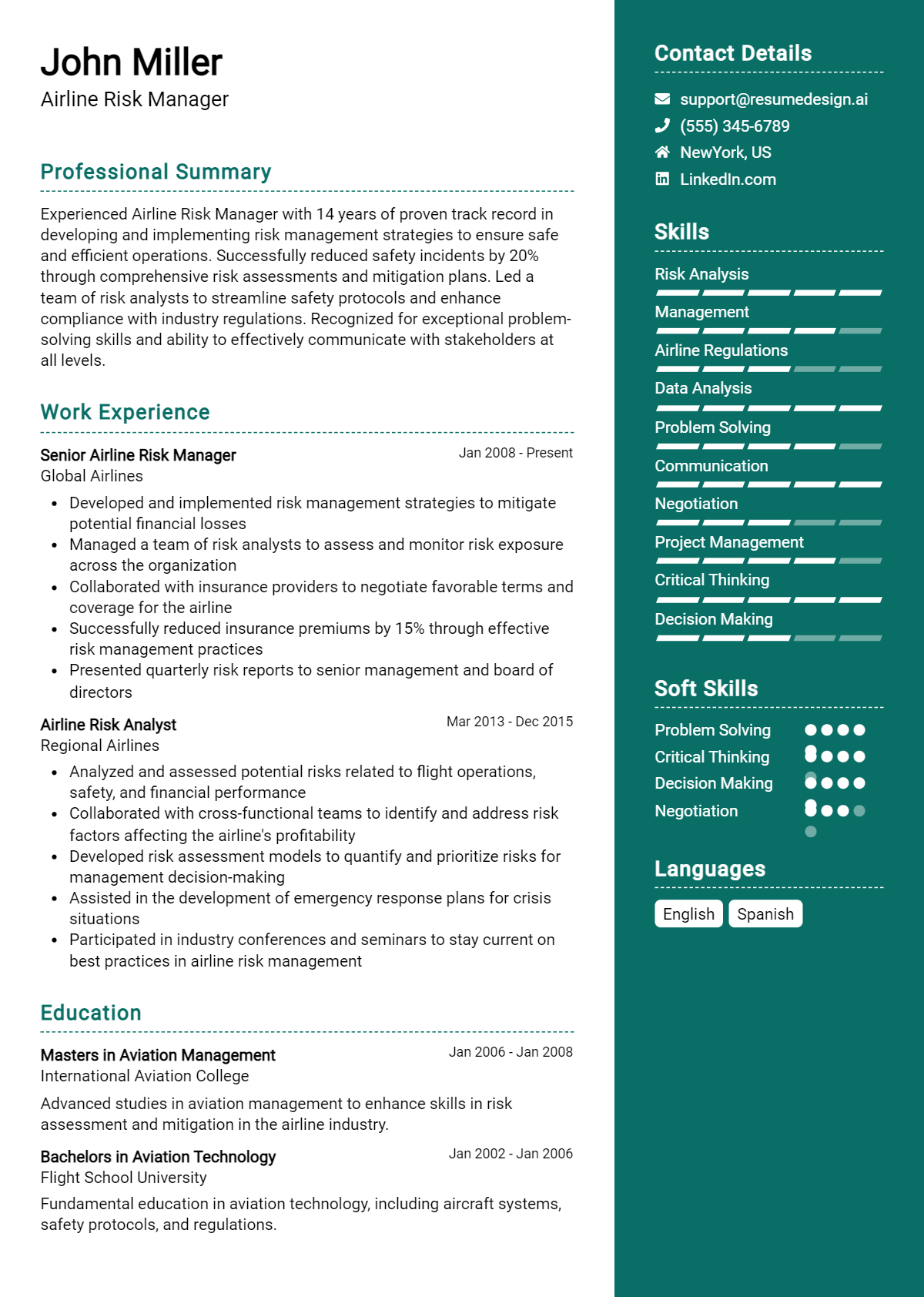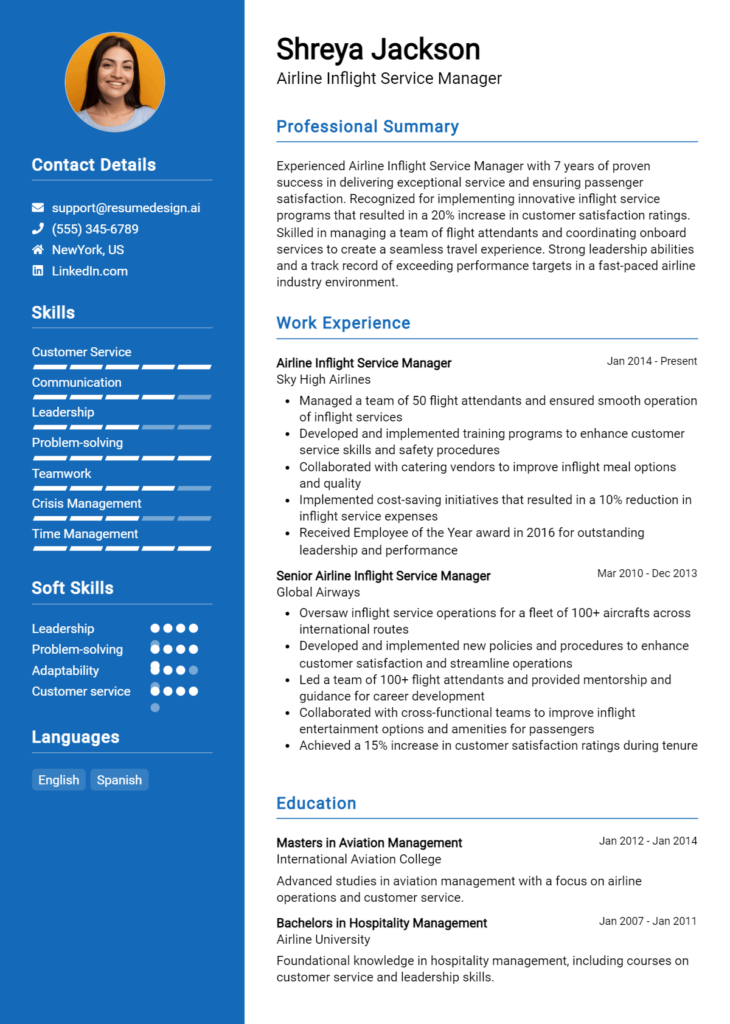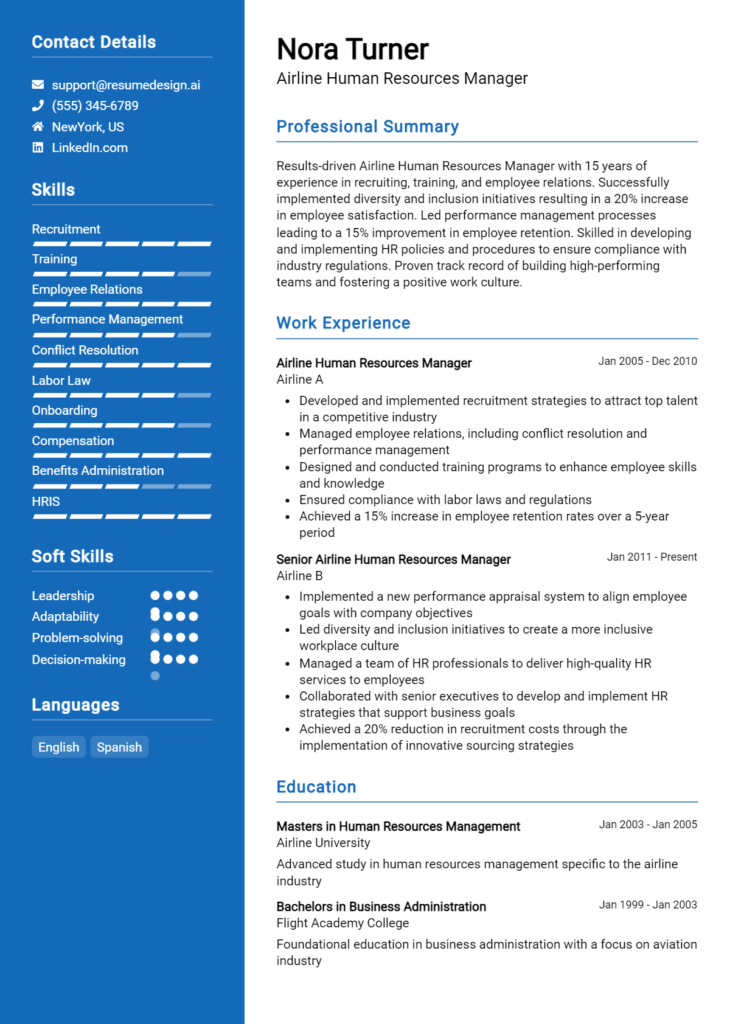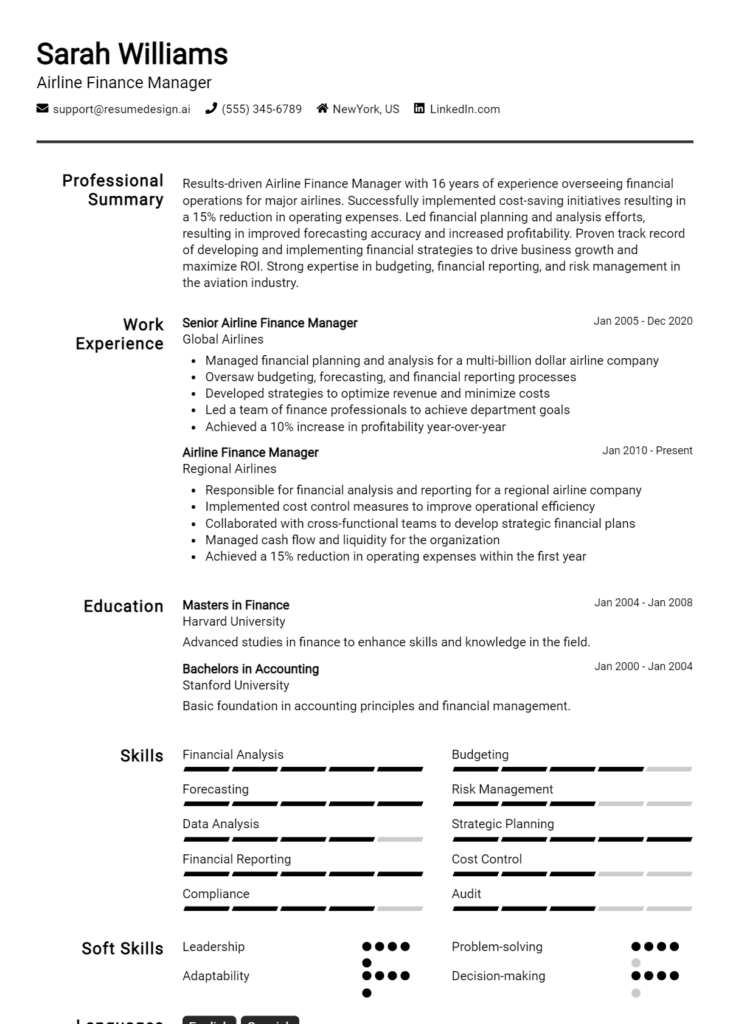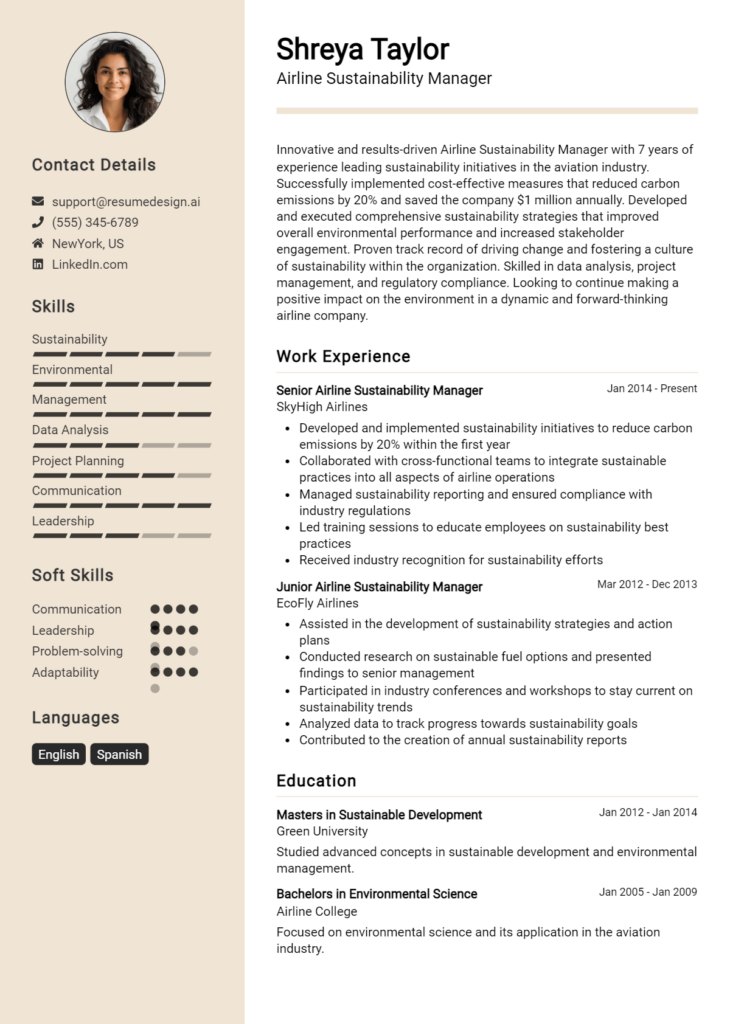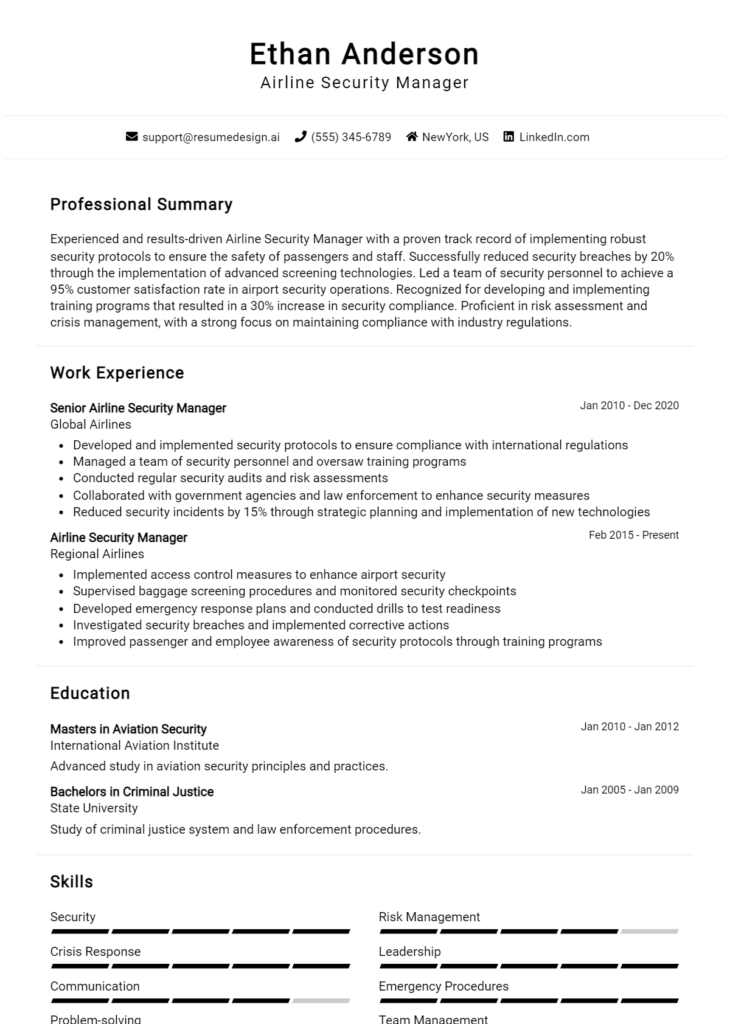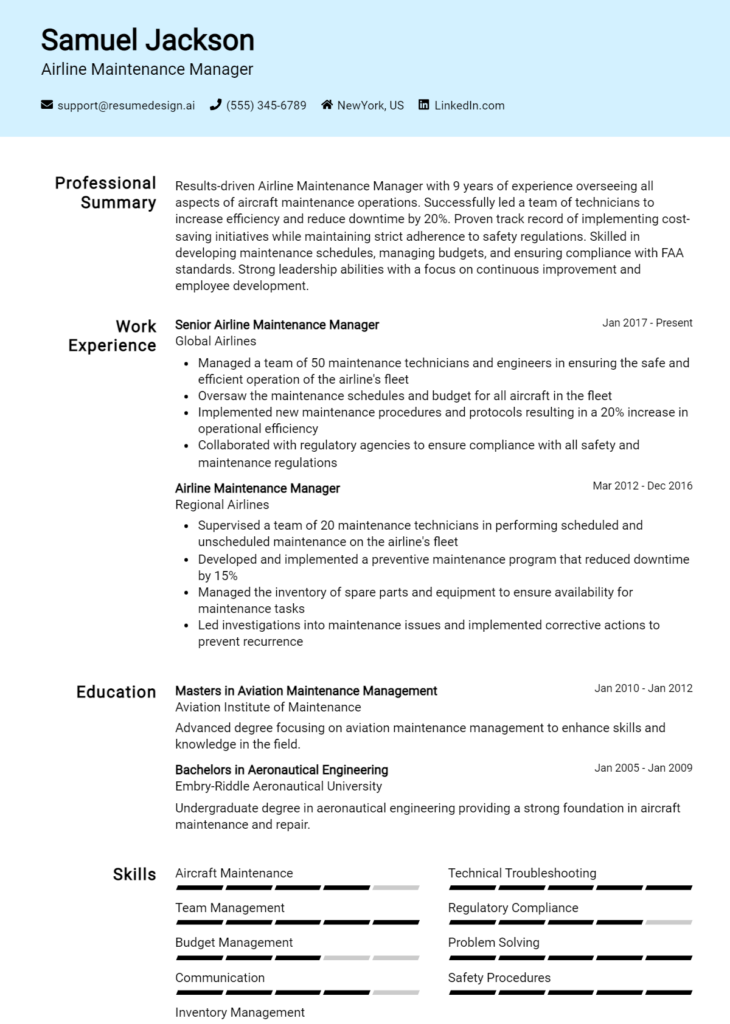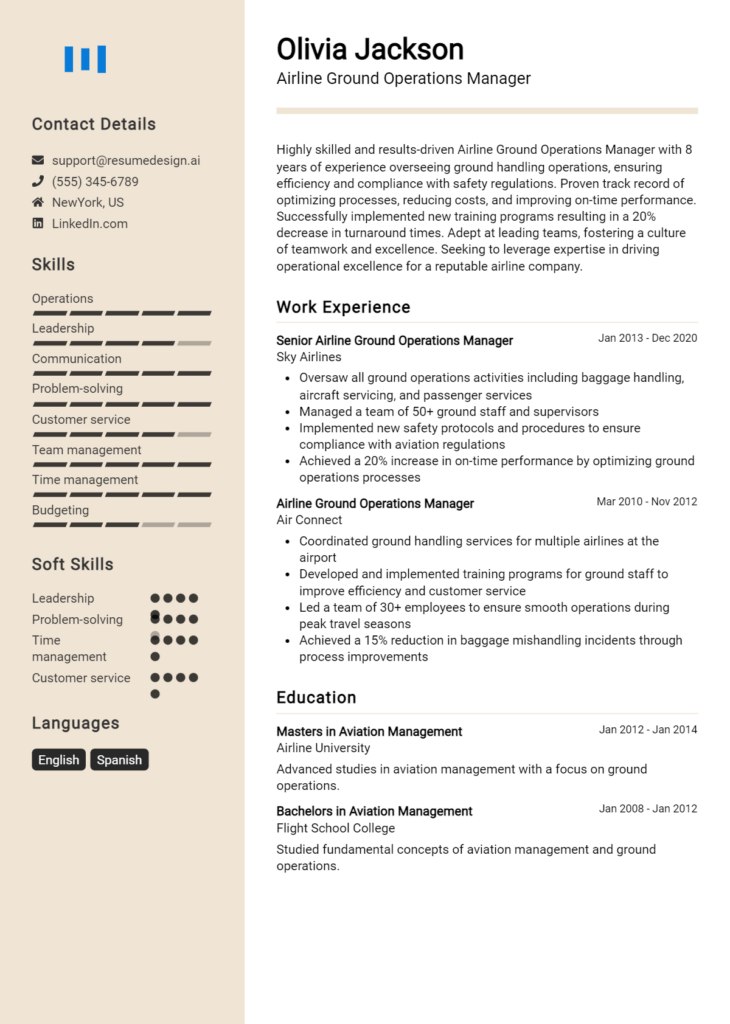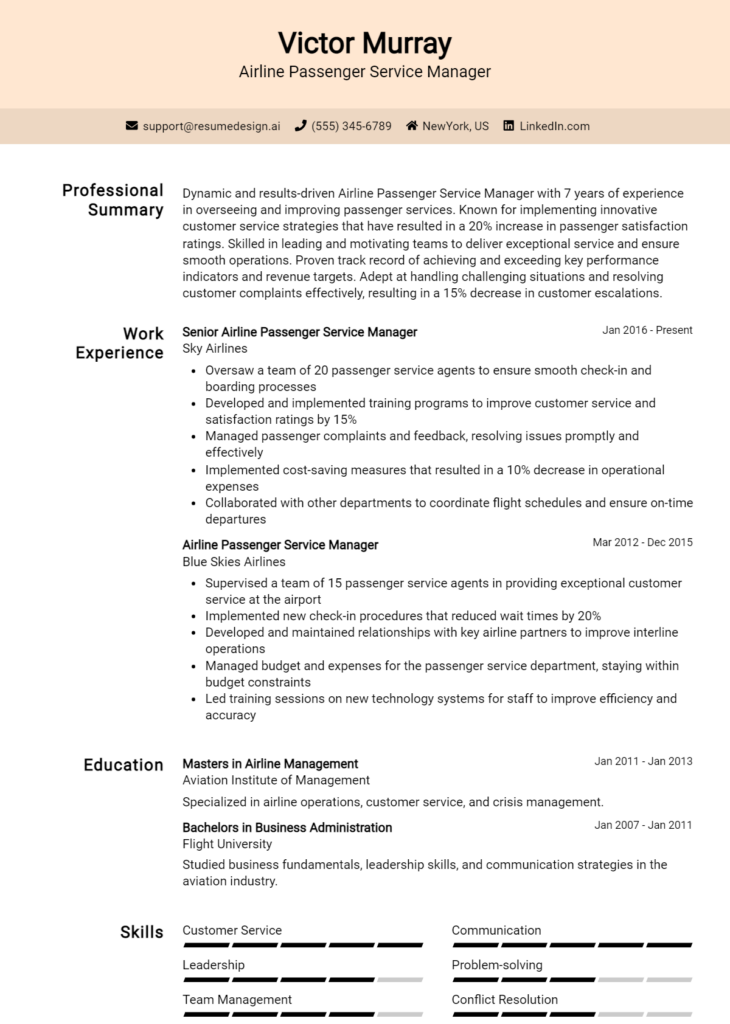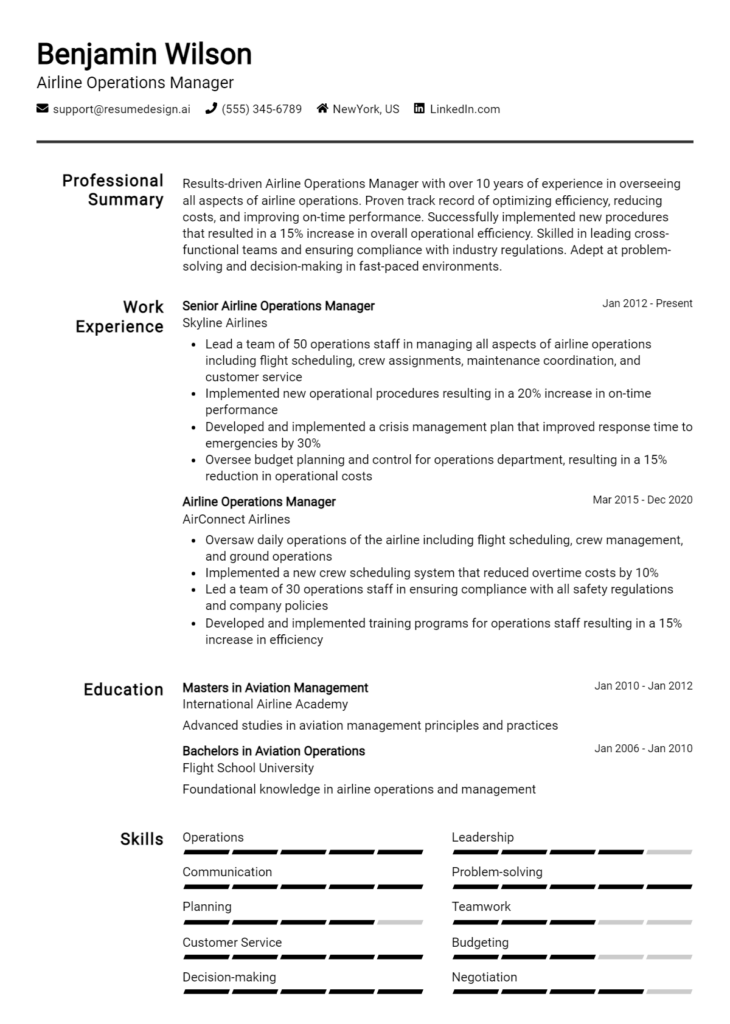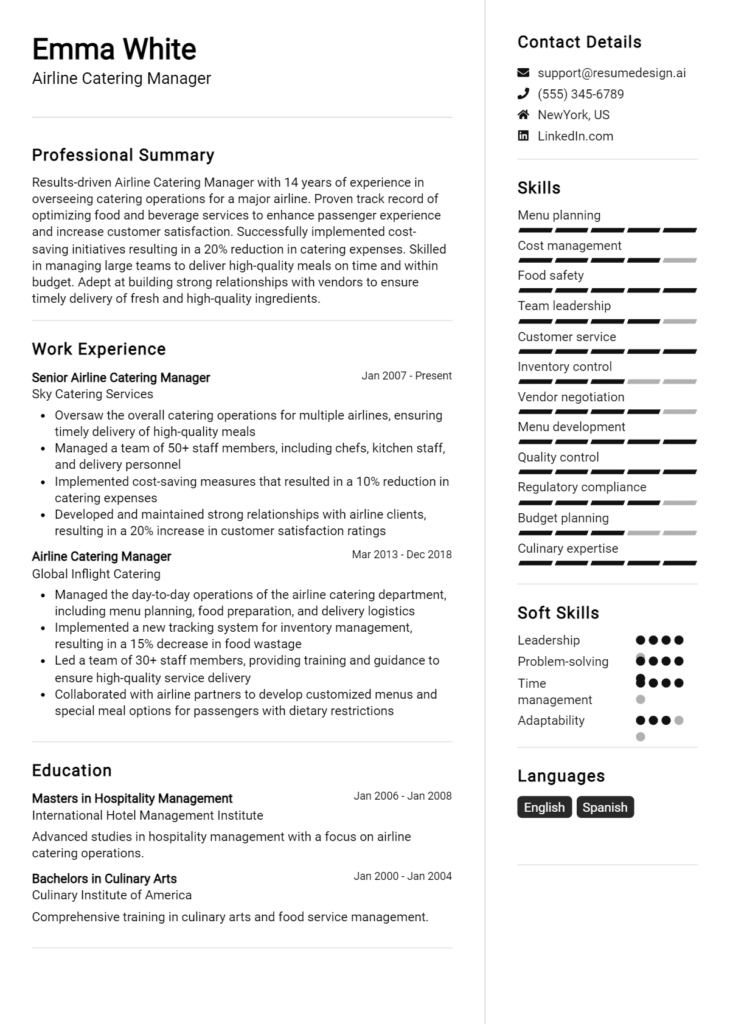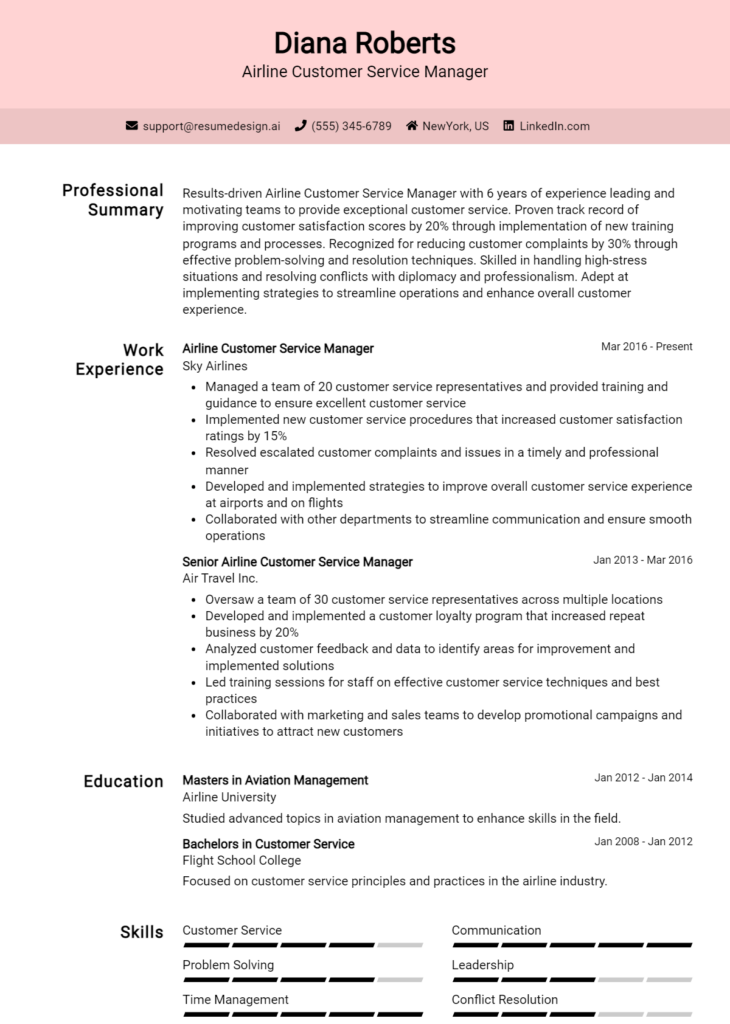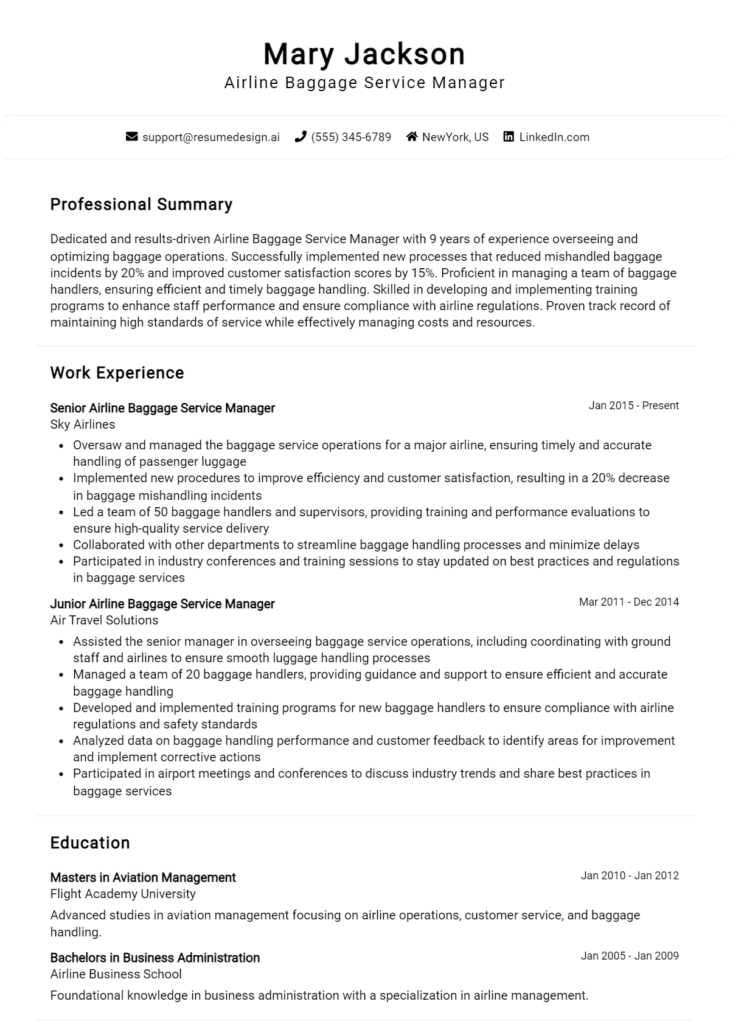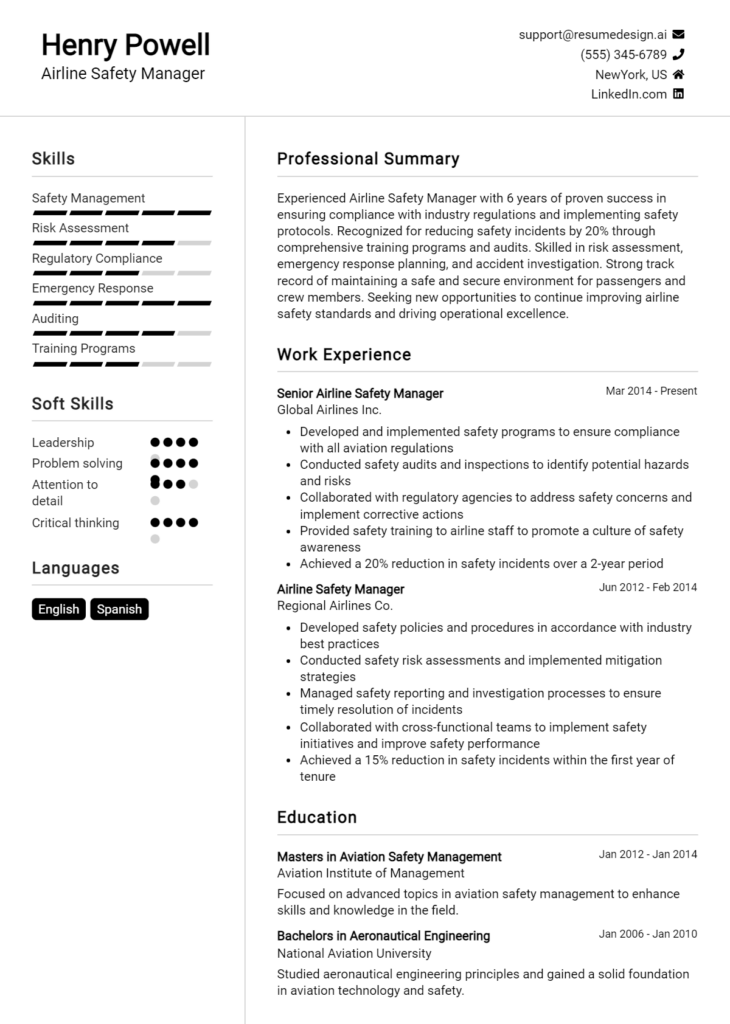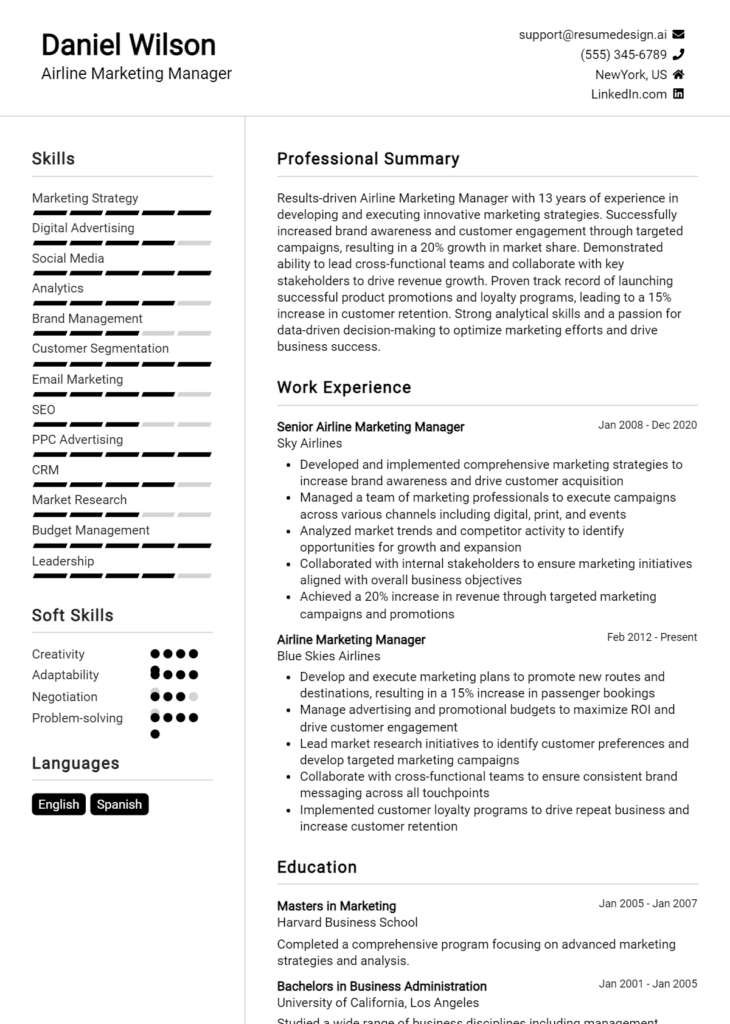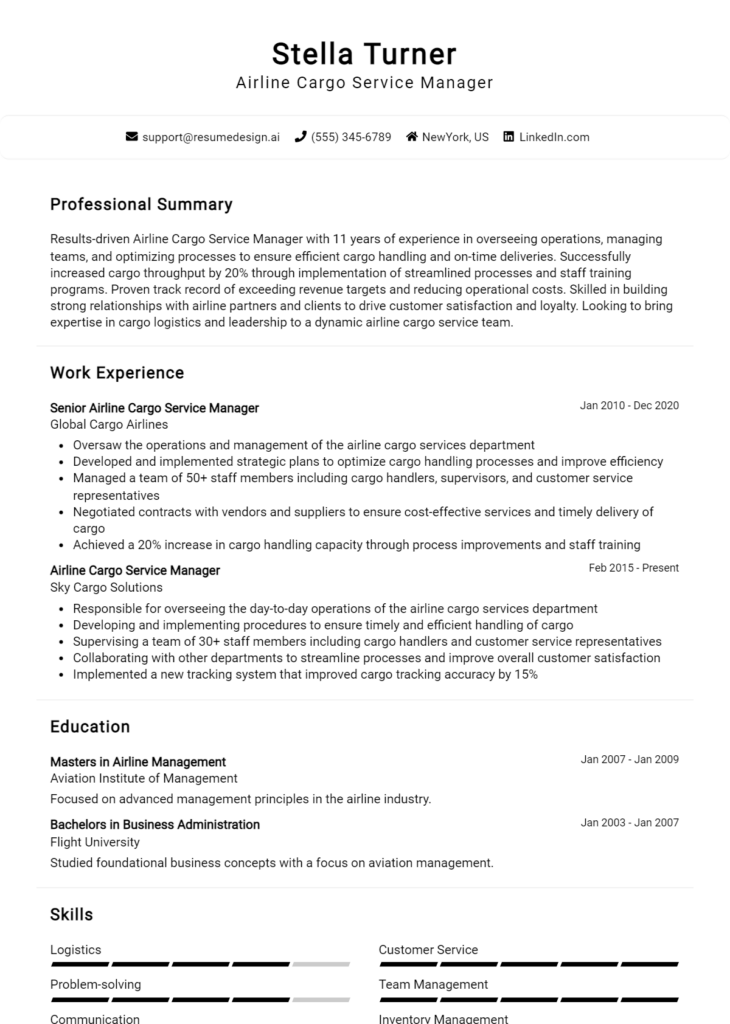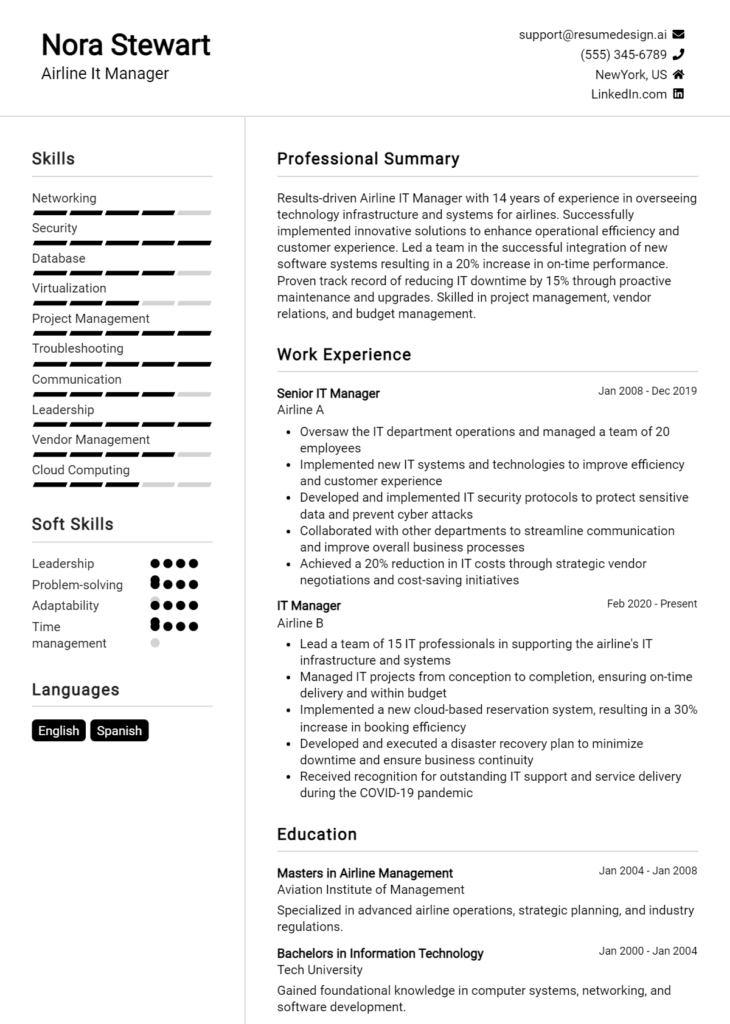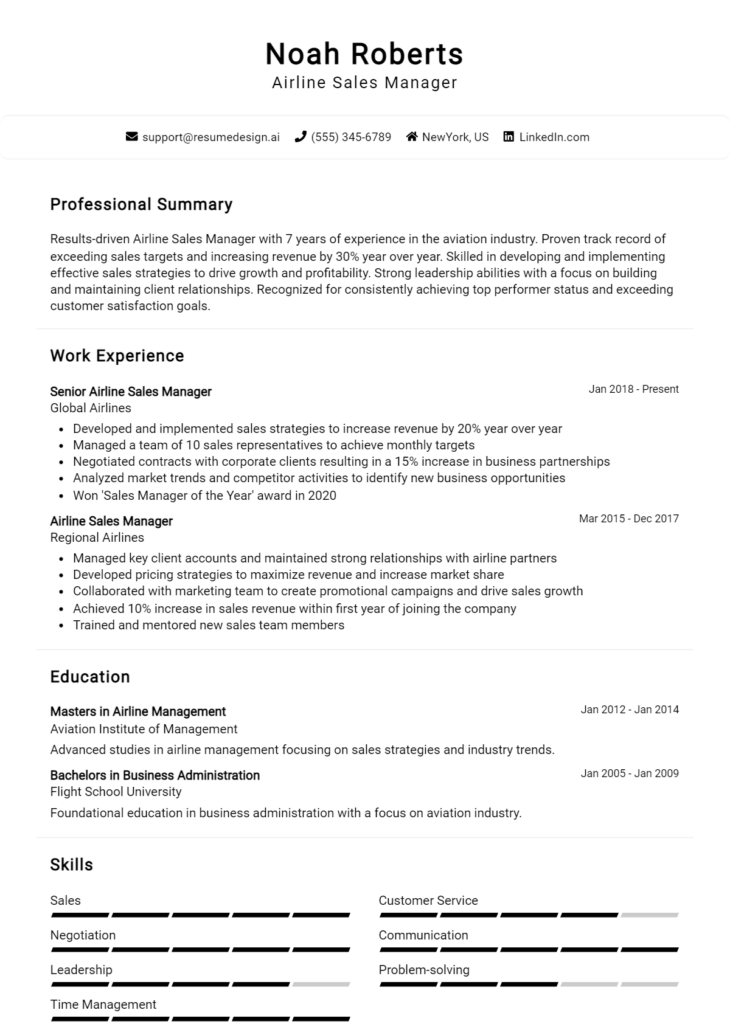Airline Risk Manager Core Responsibilities
An Airline Risk Manager is tasked with identifying, assessing, and mitigating risks that could impact airline operations. They collaborate across departments, such as safety, finance, and compliance, ensuring a cohesive approach to risk management. Key skills include technical expertise in aviation regulations, operational knowledge, and strong problem-solving abilities. These competencies are essential for achieving organizational goals, and a well-structured resume can effectively highlight these qualifications, showcasing the candidate’s readiness to protect the airline's interests.
Common Responsibilities Listed on Airline Risk Manager Resume
- Conduct thorough risk assessments and audits across airline operations.
- Develop and implement risk management policies and procedures.
- Collaborate with various departments to ensure compliance with safety regulations.
- Analyze incident reports to identify trends and mitigate future risks.
- Monitor industry regulations and best practices to ensure alignment.
- Prepare comprehensive risk management reports for senior management.
- Facilitate training programs on risk awareness and safety protocols.
- Coordinate with insurance providers to manage coverage and claims.
- Utilize data analytics to predict potential risk scenarios.
- Advise on emergency preparedness and response strategies.
- Maintain up-to-date knowledge of aviation trends and risk factors.
Why Resume Headlines & Titles are Important for Airline Risk Manager
In the competitive field of airline risk management, a well-crafted resume headline or title serves as a crucial first impression for hiring managers. These brief phrases can instantly capture attention and encapsulate a candidate's key qualifications in a powerful way. A strong headline not only highlights the applicant's expertise but also aligns closely with the specific requirements of the role, making it easier for recruiters to identify potential fits. By being concise and relevant, the right headline can set the tone for the entire resume, encouraging hiring managers to delve deeper into the applicant's background and achievements.
Best Practices for Crafting Resume Headlines for Airline Risk Manager
- Keep it concise – Aim for a headline that is clear and to the point.
- Be role-specific – Tailor the headline to reflect the airline risk manager position.
- Highlight key strengths – Focus on your most relevant skills and experiences.
- Use action-oriented language – Employ strong verbs to convey confidence and proactivity.
- Incorporate industry keywords – Utilize terminology that resonates within the airline and risk management sectors.
- Showcase accomplishments – If applicable, include quantifiable achievements to substantiate your value.
- Avoid vague language – Steer clear of generic phrases that do not differentiate you from other candidates.
- Align with job description – Make sure the headline reflects the core competencies outlined in the job listing.
Example Resume Headlines for Airline Risk Manager
Strong Resume Headlines
"Proven Airline Risk Manager with 10+ Years of Experience in Safety and Compliance"
“Strategic Risk Analyst Specializing in Aviation Safety Protocols and Regulatory Compliance”
“Dynamic Leader in Airline Risk Management Delivering 30% Reduction in Incident Rates”
“Certified Risk Management Professional with Expertise in Crisis Management for Airlines”
Weak Resume Headlines
“Seeking a Job in Risk Management”
“Experienced Professional”
The strong headlines are effective because they immediately communicate relevant qualifications and achievements, showcasing the candidate's value in a specific and impactful manner. They use industry-related language and highlight significant experience, making them more memorable to hiring managers. Conversely, the weak headlines fail to impress as they lack specificity and do not provide any meaningful insight into the candidate's skills or experience. Such vague titles do not differentiate the applicant from others, making it unlikely for them to stand out in a competitive job market.
Writing an Exceptional Airline Risk Manager Resume Summary
In the competitive field of aviation, an Airline Risk Manager resume summary serves as a crucial introduction that can make or break a candidate's first impression. A well-crafted summary quickly captures the attention of hiring managers by showcasing key skills, relevant experience, and standout accomplishments that directly relate to the role. It should be concise yet impactful, effectively highlighting the candidate's qualifications while being tailored to the specific job they are applying for. A strong summary sets the tone for the rest of the resume, demonstrating the candidate's suitability for the position and their understanding of industry challenges.
Best Practices for Writing a Airline Risk Manager Resume Summary
- Quantify Achievements: Use numbers and statistics to highlight your accomplishments, such as reducing risk incidents by a certain percentage.
- Focus on Relevant Skills: Emphasize skills that are particularly relevant to risk management in the airline industry, such as risk assessment, compliance, and crisis management.
- Tailor to Job Description: Customize your summary to align with the specific requirements and responsibilities outlined in the job posting.
- Use Action-Oriented Language: Start sentences with strong action verbs to convey proactivity and effectiveness.
- Showcase Industry Knowledge: Demonstrate a deep understanding of airline operations and risk management principles.
- Highlight Leadership Experience: If applicable, mention any roles where you led teams or projects to enhance credibility.
- Keep it Concise: Limit the summary to 2-4 sentences to ensure it remains easily digestible.
- Reflect Your Professional Brand: Ensure that your summary aligns with your overall professional image and the job you are pursuing.
Example Airline Risk Manager Resume Summaries
Strong Resume Summaries
Results-driven Airline Risk Manager with over 10 years of experience in risk analysis and mitigation strategies, successfully reducing operational risks by 25% through comprehensive training programs and proactive compliance audits.
Dedicated professional with a proven track record in risk assessment and crisis management, having led a team that identified and resolved over 50 potential safety hazards, enhancing the airline’s safety rating by 30% in just one year.
Highly skilled in developing and implementing risk management frameworks, resulting in a 15% decrease in insurance premiums and a 40% reduction in incident reports across all flight operations.
Weak Resume Summaries
Experienced in risk management and aviation.
Motivated Airline Risk Manager looking for new opportunities in a challenging environment.
The examples provided showcase the differences between strong and weak resume summaries effectively. Strong summaries offer specific achievements and quantifiable results, demonstrating the candidate's direct impact on their previous employers. They also highlight relevant skills and knowledge tailored to the airline industry. Conversely, weak summaries lack detail, fail to provide measurable outcomes, and come across as generic, making it difficult for hiring managers to see the candidate's true potential and fit for the role.
Work Experience Section for Airline Risk Manager Resume
The work experience section of an Airline Risk Manager resume is crucial as it serves as a testament to the candidate's technical proficiency and their capacity to manage teams effectively while delivering high-quality products. This section allows candidates to present their hands-on experience in risk assessment, mitigation strategies, and compliance with industry regulations. By quantifying achievements and aligning their experience with industry standards, candidates can demonstrate their value to potential employers, showcasing not only what they have accomplished but also how they can contribute to the success of the organization.
Best Practices for Airline Risk Manager Work Experience
- Highlight specific risk management frameworks and methodologies you have implemented.
- Quantify your achievements, such as reductions in incidents or improvements in safety metrics.
- Showcase your technical skills with relevant software and tools used in risk assessment.
- Detail your experience in collaborating with cross-functional teams, emphasizing teamwork and leadership.
- Use action verbs to describe your contributions and impact on projects.
- Tailor your experience to align with the specific requirements of the airline industry.
- Include continuous education or certifications relevant to risk management in aviation.
- Provide context for your responsibilities to illustrate the scope of your role.
Example Work Experiences for Airline Risk Manager
Strong Experiences
- Developed and implemented a comprehensive risk management program that reduced safety incidents by 30%, ensuring compliance with FAA regulations.
- Led a cross-departmental team to conduct a thorough risk assessment of operational processes, resulting in a 25% improvement in efficiency and a significant reduction in potential hazards.
- Utilized advanced analytics tools to identify risk trends, leading to proactive mitigation strategies that decreased operational disruptions by 40% over two years.
- Spearheaded a training initiative for staff on risk management protocols, resulting in a 50% increase in compliance rates across all departments.
Weak Experiences
- Responsible for managing risks in the airline.
- Worked on safety projects with some success.
- Assisted in various risk assessments.
- Involved in team meetings about risk management.
The examples listed as strong experiences illustrate clear, quantifiable outcomes that demonstrate effectiveness and leadership in risk management roles. They provide specific details regarding achievements and the impact of the candidate's work on the organization. In contrast, the weak experiences lack specificity and measurable results, making them less impressive and failing to effectively convey the candidate's capabilities and contributions in the field of airline risk management.
Education and Certifications Section for Airline Risk Manager Resume
The education and certifications section of an Airline Risk Manager resume is crucial as it showcases the candidate's academic credentials, relevant certifications, and commitment to ongoing professional development. This section not only highlights the foundational knowledge acquired through formal education but also emphasizes industry-specific training and certifications that enhance the candidate's expertise in risk management within the aviation sector. By detailing relevant coursework and specialized training, candidates can significantly boost their credibility and demonstrate their alignment with the requirements of the Airline Risk Manager role, making them more appealing to potential employers.
Best Practices for Airline Risk Manager Education and Certifications
- Include only relevant degrees, such as those in aviation management, risk management, finance, or related fields.
- List industry-recognized certifications, such as Certified Risk Manager (CRM) or Aviation Safety Management System (SMS) certification.
- Highlight any specialized training related to airline operations, safety protocols, or regulatory compliance.
- Provide details of relevant coursework that aligns with risk management and aviation standards.
- Use clear formatting to distinguish between degrees and certifications for easy readability.
- Keep the section updated with the latest certifications and courses to reflect continuous learning.
- Consider including any honors or recognitions received during your academic journey.
- Tailor this section to align with the specific requirements outlined in the job description.
Example Education and Certifications for Airline Risk Manager
Strong Examples
- Bachelor of Science in Aviation Management, Embry-Riddle Aeronautical University, 2020
- Certified Risk Manager (CRM), Risk and Insurance Management Society, 2021
- Coursework in Aviation Safety and Security, University of Southern California, 2019
- Certificate in Aviation Safety Management Systems, International Civil Aviation Organization (ICAO), 2022
Weak Examples
- Associate Degree in General Studies, Local Community College, 2018
- Certification in Basic First Aid, Red Cross, 2017
- Diploma in Computer Science, Correspondence Course, 2015
- Outdated Certificate in Airline Operations, Offered in 2013
The examples listed as strong are relevant and directly applicable to the responsibilities of an Airline Risk Manager, showcasing both the necessary academic background and recognized industry certifications. In contrast, the weak examples fail to align with the specific requirements of the role, either due to their irrelevance to aviation risk management or because they represent outdated or generalized qualifications. This distinction helps potential employers quickly assess the candidate's suitability for the position based on their educational and professional credentials.
Top Skills & Keywords for Airline Risk Manager Resume
An effective resume for an Airline Risk Manager requires a strategic blend of both hard and soft skills. These skills not only help in demonstrating a candidate's technical proficiency but also highlight their ability to navigate the complexities of the aviation industry. In a role that involves assessing and mitigating risks related to safety, compliance, and operational efficiency, showcasing relevant skills can set a candidate apart from the competition. Understanding the nuances of risk management, regulatory compliance, and crisis management is essential, as is the ability to communicate effectively with diverse stakeholders. Highlighting these skills can significantly enhance the impact of your resume and improve your chances of securing an interview.
Top Hard & Soft Skills for Airline Risk Manager
Soft Skills
- Strong Communication Skills
- Analytical Thinking
- Problem-Solving Abilities
- Attention to Detail
- Leadership and Team Management
- Adaptability and Flexibility
- Emotional Intelligence
- Negotiation Skills
- Conflict Resolution
- Time Management
Hard Skills
- Risk Assessment and Management
- Regulatory Compliance Knowledge
- Safety Management Systems (SMS)
- Data Analysis and Interpretation
- Financial Risk Analysis
- Incident Investigation Techniques
- Quality Assurance and Control
- Project Management
- Knowledge of Aviation Regulations (FAA, ICAO)
- Proficiency in Risk Management Software
For more comprehensive insights into how to best present your skills and work experience, consider tailoring your resume to emphasize these key areas.
Stand Out with a Winning Airline Risk Manager Cover Letter
I am excited to apply for the Airline Risk Manager position at [Company Name], as advertised on [Where You Found the Job Posting]. With a solid background in risk assessment, safety management, and regulatory compliance within the aviation industry, I am confident in my ability to contribute to your organization's commitment to operational excellence and safety. My experience with identifying, analyzing, and mitigating risks will enable me to develop robust strategies that support [Company Name]'s objectives while ensuring the safety of passengers and staff.
In my previous role at [Previous Company Name], I led a cross-functional team in conducting comprehensive risk assessments and implementing effective risk management protocols. I successfully developed policies and procedures that reduced incidents by over 30%, while also fostering a culture of safety throughout the organization. My ability to collaborate with various stakeholders, including regulatory agencies, operational teams, and executive leadership, has proven essential in maintaining compliance with aviation standards and enhancing overall risk awareness within the organization.
What sets me apart is my proactive approach to risk management. I believe in not only addressing current risks but also anticipating future challenges in the aviation landscape. I have a keen understanding of emerging threats, such as cybersecurity vulnerabilities and environmental regulations, and I am dedicated to staying ahead of industry trends. My analytical skills allow me to utilize data-driven insights to inform decision-making processes, ensuring that [Company Name] remains resilient in an increasingly complex environment.
I am eager to bring my expertise in risk management to [Company Name] and contribute to creating a safer and more efficient airline operation. I look forward to the opportunity to discuss how my experience aligns with your vision and how we can work together to further enhance the safety and reliability of your services. Thank you for considering my application.
Common Mistakes to Avoid in a Airline Risk Manager Resume
When crafting a resume for an Airline Risk Manager position, it's crucial to present your skills and experiences effectively to stand out among candidates. However, many applicants make common mistakes that can undermine their qualifications. Understanding and avoiding these pitfalls can significantly enhance the quality of your resume, making it more appealing to hiring managers. Here are some common mistakes to watch out for:
Vague Job Descriptions: Failing to provide specific details about previous roles can leave employers unsure of your capabilities. Instead, quantify your achievements and responsibilities with concrete examples.
Lack of Relevant Keywords: Not incorporating industry-specific keywords can lead to your resume being filtered out by applicant tracking systems (ATS). Research common terms in the airline risk management field and include them naturally in your resume.
Ignoring Soft Skills: While technical expertise is critical, neglecting to highlight soft skills such as communication, problem-solving, and teamwork can weaken your application. These skills are vital for managing risks effectively within an airline environment.
Poor Formatting: A cluttered or overly complicated format can distract from your qualifications. Use a clean, professional layout with clear headings and bullet points to improve readability.
Not Tailoring the Resume: Submitting a generic resume without customizing it for the airline industry or specific job can demonstrate a lack of interest. Tailor your resume to reflect the requirements of each position you apply for.
Neglecting Achievements: Focusing solely on duties rather than accomplishments can make your experience seem less impactful. Highlight metrics and success stories that showcase your contributions to previous employers.
Omitting Certifications: In the airline industry, certain certifications can enhance your credibility. Failing to list relevant certifications or professional development courses can prevent your resume from standing out.
Typos and Grammatical Errors: Simple mistakes can create a negative impression, suggesting a lack of attention to detail. Always proofread your resume multiple times, and consider having someone else review it as well.
Conclusion
As we explored the vital role of an Airline Risk Manager, we highlighted several key responsibilities that define this position. From assessing operational risks to implementing safety measures and ensuring compliance with regulations, the Airline Risk Manager plays a crucial part in safeguarding the airline's assets and reputation. Additionally, we discussed the importance of data analysis in identifying potential threats and the need for strong communication skills to effectively collaborate with various stakeholders.
In conclusion, if you're looking to take the next step in your career as an Airline Risk Manager, it’s essential to have a resume that reflects your expertise and experience. We encourage you to review your resume to ensure it showcases your skills effectively. To assist you in this process, consider utilizing the various resources available, such as resume templates, a user-friendly resume builder, and resume examples that can inspire your own design. Don’t forget to also check out cover letter templates to complement your application. Take action now and elevate your career prospects in the airline industry!

